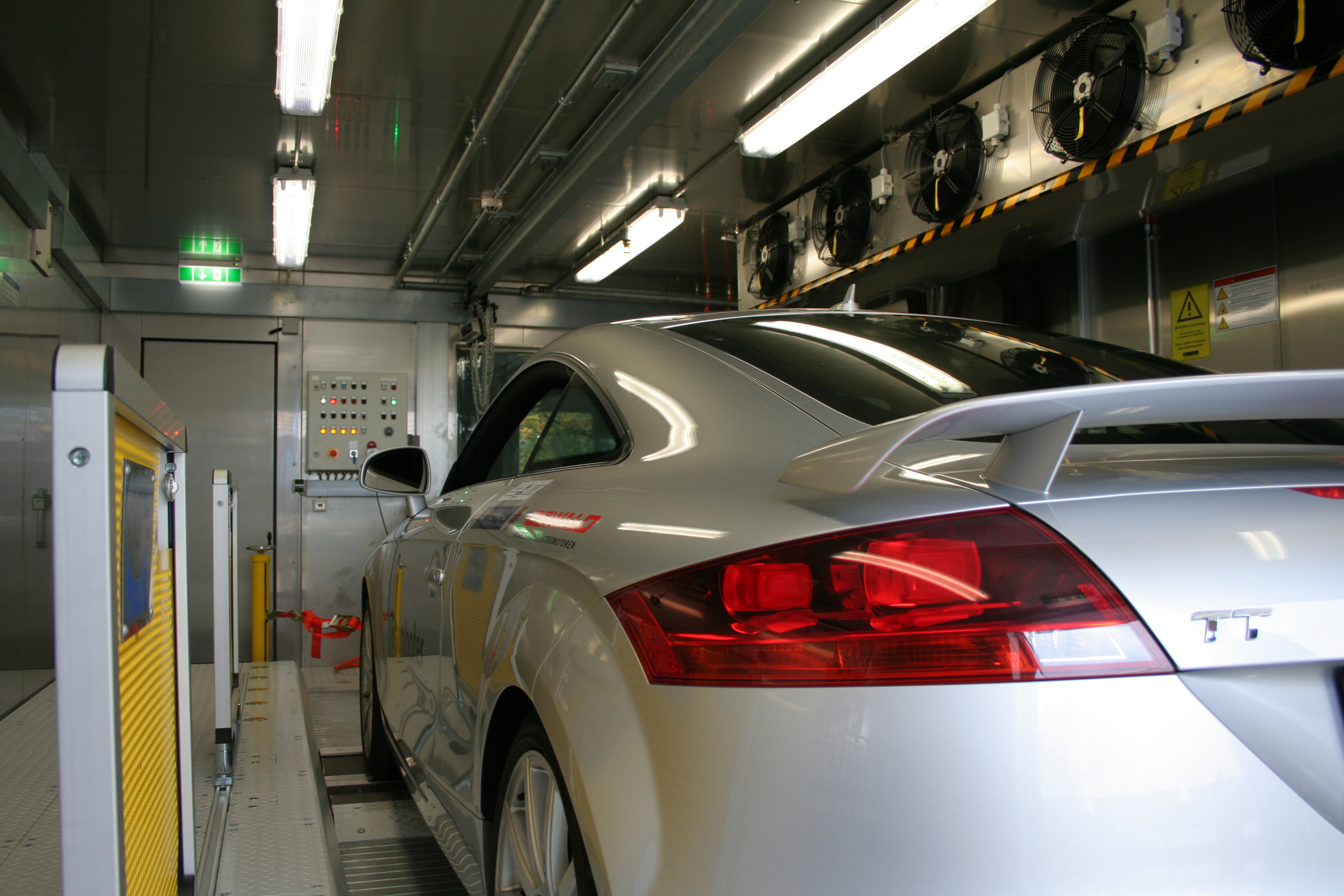Vehicles with electric drive trains place completely new demands on measurement and testing technology. The Fraunhofer IISB test center in Erlangen, Germany, offers a unique infrastructure tailored specifically to these requirements, in which individual components from electric vehicles to complete vehicles can be measured and optimized.
The test center includes test benches for electric drives, energy storage, electrical-thermal reliability and electromagnetic compatibility.
The core element is a roller test bench in a temperature-controlled test room. This means that tests can also be carried out on complete vehicles, e.g. on the range under extreme ambient conditions. One development goal is to minimize the total energy requirements of the vehicles through optimized thermal management, highly efficient power electronics and energy-efficient auxiliary units.
Test center for electric vehicles
The test bench offers a professional automation system with high-precision measurement of currents, voltages, torques and speeds as well as a Matlab/Simulink interface as a direct connection to our vehicle simulation platform. Each of the two test bench machines can apply any load profile within the following limits:
- Torque: 1,400 Nm / 3,000 Nm (S1/S6)
- Shaft power: 129 kW / 275 kW (S1/S6)
The maximum axle track width is 1,800 mm.
The range of an electric vehicle does not only depend on the vehicle data, the energy content of the battery and the driving cycle. Auxiliary units, e.g. for air conditioning, heating and lighting, also influence the range, as do the highly temperature-dependent properties of the battery.
On the IISB's all-wheel roller test bench, complete vehicle tests can be carried out with road and driving cycle simulations over a wide ambient temperature range.
The roller test bench is excellently suited:
- For determining the efficiency of a drive train, vehicle energy consumption and range
- For road and driving cycle simulations
- Verification of simulation models
- Parameterization of simulation models
- The development and verification of control algorithms for the powertrain and the entire vehicle.
Particular attention is paid to the central component of electric vehicles, the electrical energy storage system. Extensive measuring equipment allows the electrical and thermal characterization of single cells as well as entire vehicle battery systems.
A specially protected test container outside the test centre allows the performance limits of the energy storage system to be pushed to the limit - and even beyond if necessary - in order to investigate, for example, the safety and heating properties of batteries.
The temperature changes take place via the coolant, so that, in contrast to current test procedures, the temperature and stress distributions in the test specimen are very similar to the real operating conditions.
Any temperature change within the interval from -40 °C to +115 °C is possible, the gradient of the temperature change can be defined.
Any active cycles can be superimposed on these passive temperature cycles. Fields of application of the shock system are, for example, electrical drive units with integrated power electronics or battery systems.
We offer a broad range of services from consulting in case of EMC problems to different measurements according to harmonized standards to very detailed circuit and layout optimizations.
The electrical power processed in hybrid and electric vehicles is around two orders of magnitude higher than the electrical power in today's cars - with almost the same limits for electromagnetic interference emissions to be complied with. In addition, the structure of the high-voltage electrical system is fundamentally different from that of the chassis-related 12V electrical system, which brings with it completely new requirements.
Electromagnetic compatibility is therefore a central topic in the development of system components and vehicles with electric drive trains - and a topic with still considerable R&D needs.
The test center has a high-quality, car-accessible shielded room for measurements on electrical powertrain components during development, for investigating coupling paths and for optimizing filter solutions.
This is completely lined with ferrite absorbers, which qualifies it for measurements over a wide frequency range. In addition, the EMC center is equipped with state-of-the-art measurement and testing technology.
We pay special attention to the investigation of high-performance components of the drive train. Each DUT in the shielded chamber can be supplied with power via voltage-resistant and high-current capable feedthrough filters (690 V AC, 250 A and 1000 V DC, 500 A), network simulations and real energy storage devices (as an alternative to electronic sources) as well as via a coolant feedthrough.
 Fraunhofer Institute for Integrated Systems and Device Technology IISB
Fraunhofer Institute for Integrated Systems and Device Technology IISB
